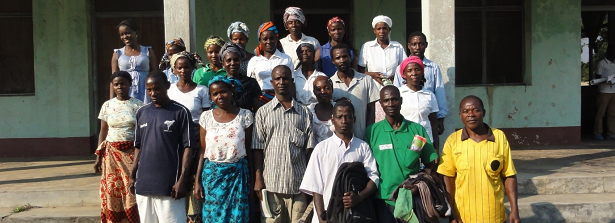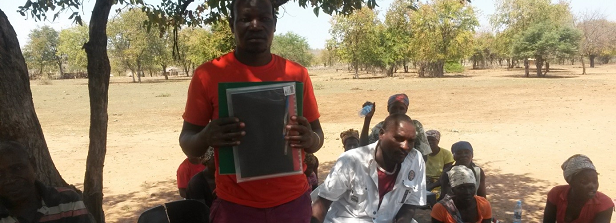Mozambique: land, inclusive business & food security

Duration: August 2014 – December 2016. This project has been finalized.
Project information
Aim: “Bridging the gaps between policy and practice on land governance, inclusive business and food security in Mozambique” is an interdisciplinary research project at the interfaces of land governance & land-user rights, business development, livelihoods, food security and gender. It is implemented by ActionAid-Mozambique, Utrecht University-International Development Studies (UU-IDS) and ActionAid in the Netherlands.
Within the context of the Dutch strategy for international cooperation on food security, the project aims to provide engendered insights and recommendations for land governance, sustainable business, livelihood development and food security in Mozambique. The project will provide engendered recommendations aimed at inclusive business development, resilient and sustainable livelihoods as to guarantee the right to food for women and men.
Key Objectives:
- To study how large-scale rural investments impact on local communities, women in particular, their livelihoods and food security;
- To study what models of investments can be most inclusive (pro-poor) and environmentally sustainable;
- To study how locally-rooted private sector development can provide promising alternatives for sustainable and inclusive development and food security in Mozambique.
Research questions:
- Type and variation of investments in Mozambique?
- What models are more or less dominant, or alternatives?
- What are the experiences and impacts to date?
- Can different models, corporate, SME or micro/ smallholder driven, coexist and fruitfully benefit each other?
- What –combinations of – alternative models can be proposed by optimizing livelihood development and food security of local communities, women and men, at large?
Method: The project conducts a comprehensive community-led action research in combination with broader (local, national and international) stakeholder consultations and policy & contextual desk research. The community–led action research consists of engendered participatory diagnosis, community visioning, community action planning and prioritized actions.
The project facilitates communities to come up with their community action plans and facilitates some of their prioritized actions.
Country: Mozambique, the Massingir district in Gaza province and the Maganja da Costa district in Zambezia province. The broader national and provincial contexts are also taken into consideration.
Dutch policy goal: Increase sustainable food production.
Progress reports
Year 1: In recent years, Mozambique has been experiencing large-scale investments from both national and multi-national companies and these exclude local poor communities (especially small holder farmers) in actively participating in investment decision-making processes and also in benefitting from investments. The “Bridging the Gaps between Policy and Practice on Land Governance, Inclusive Business and food Security in Mozambique” project, aims at investigating whether and how large-scale investments impact on land governance, livelihood and food security of local communities promoting more inclusive business opportunities particularly at local level.
Year 2: To explore the impact of gender, land rights and business models on food security in Mozambique, the team conducted group discussions and semi-structured interviews in Massingir district in Gaza Province. In Massingir, food security is at risk due to the expansion of the Limpopo National Park and of the Massingir Agro Industrials (MAI) sugarcane concession. The researchers selected 5 communities for an initial community participatory diagnosis (CPD). They also conducted interviews with officials of LNP, MAI and the district administration to understand the investors’ perspectives and future plans.
Compensations suboptimal
The study in Massingir revealed that compensations for resettled communities have been sub-optimal. Moreover, Limpopo National Park has failed to secure the re-settlers’ access to land and water, so livelihoods insecurity is a serious issue in the surrounding communities. One of the communities lost parts of its territory to Massingir Agro Industrial through a non-democratic consultation process involving a traditional leader. So the investment process has not been inclusive, and the principle of free and prior informed consent of all community members was not taken seriously.
Community consultation
The team also conducted interviews in Maganja da Costa district in Zambezia Province, where much of the infrastructure is destroyed because of heavy flooding. There the team paid particular attention to the Dutch public infrastructure subsidy program, ORIO, which co-finances the Munda-Munda flood control and irrigation scheme in Nante. This study revealed that, despite years of delays for the infrastructure reconstruction, community consultation did not take place, especially not with women and vulnerable community members who rely on small-scale rice production. Communities also feared that the current infrastructure design may not stand against heavy flooding. Moreover, questions about land rights and the role of women in water control were unanswered. So the next step in Massingir and in Maganja da Costa entails elaboration and implementation of community action plans. The team will also explore ways to improve communication and coordination between stakeholders and the communities.
Final report
Summary of the results: In recent years, large-scale rural investments by both foreign and domestic investors have been on the rise in Mozambique. The project aimed at investigating whether and how large-scale rural investments impact on land governance, livelihoods and food security of local communities, women and men.
Communities took centre stage in innovative Community Participatory and Empowering Action Research (CPEAR) serving participatory diagnosis of large-scale land based investments and the impact on livelihoods and food security. In addition, broad stakeholder consultations, household surveys and desk research took place.
For most of the investments, stakeholder communication and community consultations have been weak. Many smallholder farmers, women in particular, did not participate in community consultations, let alone in real decision making about investments. The majority did not receive benefit from the investment projects. On the contrary, they often experience negative impacts on the livelihoods and food security.
Through CPEAR community action plans were drawn up for community rooted advocacy and development. Some essential actions were taken and broader recommendations were made to communities, community leaders, national and local governments, the private sector, NGOs and donors for community and women’s land rights, more inclusive business development, local socioeconomic development, sustainable livelihoods and the right to food.

